Issue 102 : 10 April 2022
Talofa Lava, Kia Orana, Malo E Leilei, Tena Koutou, Hello ...
... and welcome to the latest issue of “For The Love Of The Game”, the official e-zine of the New Zealand Amateur Sport Association Inc., founded in Wellington, New Zealand in 2017.
If you have any feedback on this issue, ideas for future articles, or would like to contact the Editor, please click here. And, you are invited to forward the e-zine to others you know, who may be interested in reading it. An archive of earlier editions of the e-zine can be found here. For those who follow Twitter, you can also follow the Association, @AmateurSportNZ.
If you are interested in applying for membership of the Association, please click here.
Dynasty Sport On-Board For 2022 ...
The Association is delighted to announce the continued sponsorship of Dynasty Sport Limited, as the principal sponsor of the National Sport Club Survey in 2022. This is the fourth year that Dynasty has provided its financial support of New Zealand’s only survey of community sport clubs, demonstrating the company’s commitment to the future of amateur sport in New Zealand.

Dynasty Sport proudly supplies high quality, custom on and off-field garments and support to professional partners, grassroots, clubs, educational facilities and charities across New Zealand and Australia. For more information on how Dynasty Sport can help your sport club with member apparel (on and off-field), please click here.
Incorporated Societies Bill Has Its Third Reading And Is Enacted ...
Despite a warning of “unintended but possible consequences” of clauses 53 and 54, Parliament concluded its Third Reading of the Incorporated Societies Bill on Thursday, 31 March. This was the final legislative step before the Bill was presented to the Governor General to be “signed into law”, which occurred on Tuesday, 5 April.
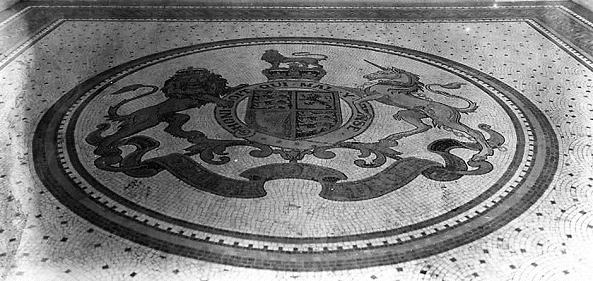
(Parliament has progressed the Incorporated Societies Bill through its Third Reading into law)
The Hon. Judith Collins (National) in noting that clauses 53 and 54 were modelled on sections 135 and 136 of the Companies Act which have “quite severe consequences” for non-compliance, noted that “we don't want to see those same consequences visited upon the incorporated society that owns a tennis club.”
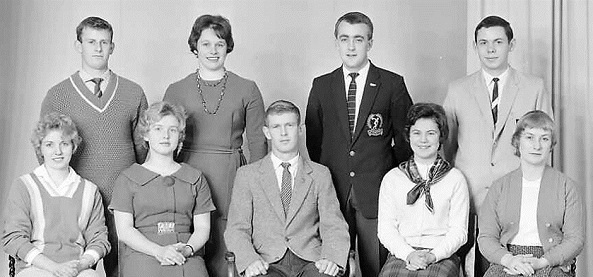
(The willingness of club members to volunteer for executive positions is now in question)
Ms Collins went on to note that “we need all the volunteers we possibly can, helping to build social cohesion after what we've all been going through with the pandemic and it is really important that people don't feel frightened. As we know, many of the people who come and take up those roles are in the - let's say it - more twilight years of their lives and the last thing they want is risk. They certainly can't afford, in most cases, to purchase insurance for it.”
You can read more here (from Hansard) and in Issue 90 of For the Love of the Game, here.
Viewpoint : “Extinction Event” Looms For Community Sport Bodies ...
Beneath many of the congratulatory speeches in Parliament’s debating chamber on the passage of the new Incorporated Societies Act lies the fear that the modernisation of the 1908 law will create an “extinction event” for many currently incorporated sport clubs which already struggle to attract volunteer governance and administration roles under comparatively light regulation.

There are three principal issues (among many) which arise from the new law: a. cost of change, (in time and money for “reconstituting” most entities), b. new compliance obligations, (which will be beyond the knowledge, skills, competence or interest of fewer volunteers to undertake); and c. unintended consequential impacts, (such as ineligibility for an “amateur sports promoters income tax exemption”, if an incorporated organisation’s status lapses).

This Association suggests that many small community sport organisations (where a small number of individuals undertake most of the existing governance roles), may simply elect to “wind-up”, or continue to operate in an unincorporated manner, non-compliant with the new law.
Renewed Political Interest In Lowering Financial Barriers ...
The Association understands that there may be renewed political interest in the introduction of a voucher scheme to assist families who face increasing financial barrieris to participating in community sport. While a universal scheme may be off the table for now, a more targeted scheme which provides support where its needed most would be a positive step forward.

As this Association has promoted for a number of years now, the voucher could be modelled on similar schemes which have successfully been in place across the Tasman, (where there is a universal system for every school-age child, regardless of household income).
COVID Couldn’t Stop “Button Soccer” ...
The “International Table Football Confederation” is not an amateur sport organisation which receives much by way of global media attention. Formed in 1993 in Tiszavasvári, Hungary, the Confederation represents three sports: “sectorball”; “12 Touch” and “Chapas”, with the international body holding a World Championship, World Cup, European Championship and South America Championship.
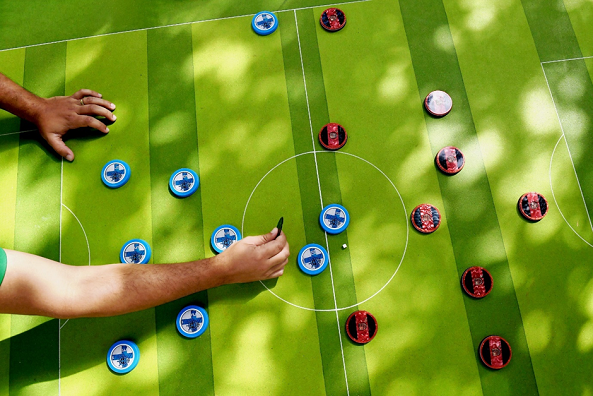
(Played for over 100 years, Table Football became an international sport in 1993)
The premise of the game is very similar to that of regular soccer (11 players on each side competing to score goals with a ball), except it’s played on a table with buttons. During the global COVID outbreak, in South America the game morphed into an online app which was downloaded over 2.3 million times for Android alone, as a “temporary alternative during the pandemic.” While the digital game has gained momentum, István Martónfi, vice president of the International Table Football Confederation notes that in-person events have stalled, “globally, during the pandemic only a few local championships were organised, only in small communities. It is a very bad and unfortunate situation.”
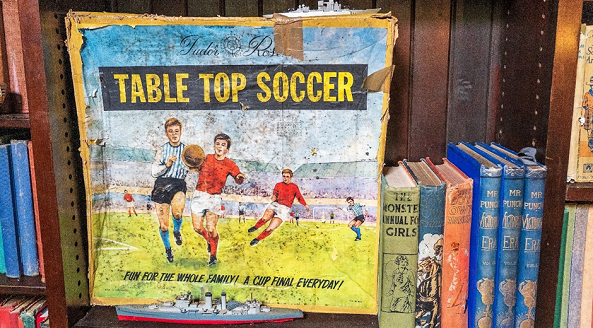
You can read more about the Confederation here, and more about how the sport of table football is coping with the impact of the COVID pandemic, here.
Masters Sport & Cardiovascular Risk ...
Researchers have found that one in five players aged 35 years or older who play football, experienced one or more potential cardiac symptoms while playing in the past year, but only one in four of them sought medical attention.
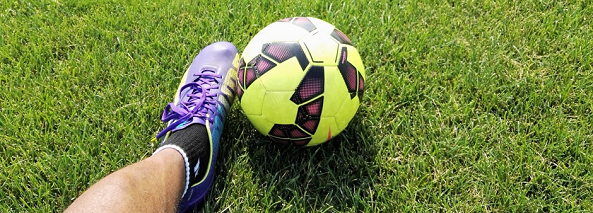
(80% of masters footballers play "for the love of the game")
In the survey of 153 amateur masters footballers (aged 35 years and older) from Sydney, in response to a hypothetical episode of chest pain while playing, less than half (46.6 percent) said they would leave the field immediately, while 49 percent said they would stay on the field for 5-10 minutes to see if the pain eased, The study also revealed that most popular reasons for playing football were "social interaction and enjoyment" (93.5 percent), "health and exercise" (89.5 percent) and "love of the game" (79.7 per cent).

(Only one in four who experience cardiac symptoms on-field will seek medical attention)
The research suggests that clubs should (to the extent appropriate for their sport) remain aware of the health risks to their older participants and ensure that appropriate educational information and (if necessary) first-aid equipment is available in the event of a medical emergency.

(Automated External Defibrillators - AEDs - are becoming more common at sport venues)
You can read more about the research from the University of Sydney by clicking here.
Annual General Meeting – Reminder ...
A reminder that the sixth Annual General Meeting of the Association will be held in the Scott Room of the Wellesley Boutique Hotel, Wellington on Tuesday, 26 April 2022 at 5.30pm.

All members of the Association are warmly invited to attend. While the Association’s Constitution does not currently allow for virtual attendance for voting purposes, a ZOOM link will be available for those wishing to join the meeting remotely. If you are intending to attend the Annual General Meeting (either in person or remotely), please contact the Association by clicking here.
From The Archives ...
PRESS, VOLUME CVI, ISSUE 31093, 23 JUNE 1966, PAGE 14
Test Cricketer, R. Blunt, Dead
(Special Credit N.Z.P.A.) LONDON
“The death has occurred in London of the former New Zealand international cricketer, Mr Roger Blunt. Mr Blunt was aged 65. He played in nine tests for New Zealand, the first being in the 1927 season against England at home.
He also represented New Zealand against the touring South African team in 1931 and later that year was a member of the New Zealand team that toured England. Mr Blunt is one of two New Zealanders to score more than 300 runs in an innings in first-class cricket. He scored 338 not out for Otago against Canterbury at Christchurch in the 1931-32 season.”
Roger Charles Blunt was born on 3 November 1900, one of four sons of Professor Thomas Gaire Rockstro and Edith Blanche (nee Wilkinson) Blunt. In 1900, Roger’s father (an Oxford University Professor) was appointed the Professor of Modern Languages at Canterbury College in Christchurch and the family emigrated from London to New Zealand.
Roger was educated at Christ’s College and played cricket for the College First XI for four years, (1915 through to 1918). Blunt played for Canterbury when 17 years old, and was still at college where he shared a record first wicket stand of 214 in 110 minutes against Christchurch Boys’ High School, before going on to a personal double century.
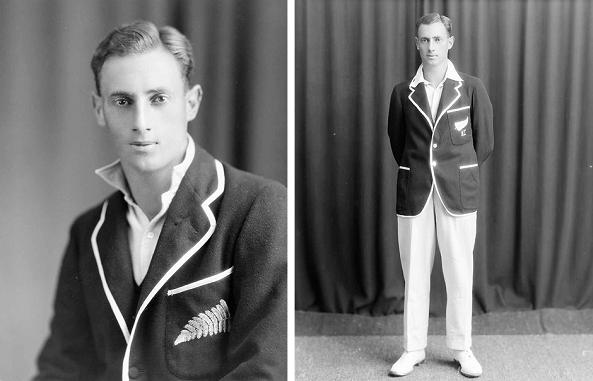
(Roger Charles Blunt, 123 first class matches, 8,000 runs, 214 wickets)
From the start of his representative career, he took wickets readily with well-controlled leg-breaks. In club cricket, Blunt set a record by hitting seven sixes into the Hagley Park trees in one eight-ball over. For Canterbury, he made 174 and shared a double-century opening stand against a strong MCC team, and a few years later he scored three consecutive centuries for New Zealand against the Melbourne Cricket Club.
Blunt was the outstanding all-rounder of New Zealand's first English tour in 1927 and he was again a great success on the second tour in 1931. Playing for Otago, he set a New Zealand record in 1931-32 by making 338 not out in 335 minutes, with a last wicket stand of 184.
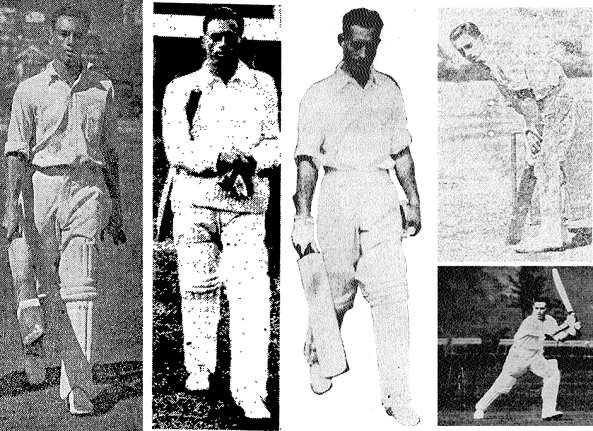
(Blunt is regarded as one of New Zealand’s greatest cricketers in the amateur era)
At the age of 33 He went to England for a business career and never returned to New Zealand. His cricketing career brought him just on 8,000 runs at an average of 41. In his 77 appearances for New Zealand, he averaged almost 40 runs. Blunt played 123 first class matches and took 214 wickets. In later life, Blunt became a radio commentator joining the BBC team for the 1949 New Zealand tour of England. He was appointed a Member of the Order of the British Empire in the 1965 Queen's Birthday Honours and was dead the following year.
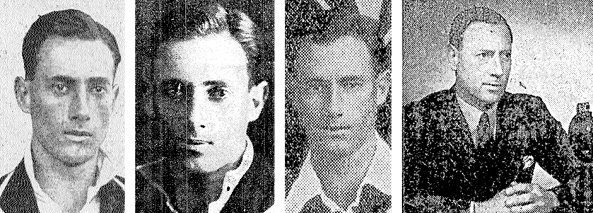
(The many photographed faces of Roger Charles Blunt)
The Final Word ...
“True sportsmanship is knowing that you need your opponent, (because without him or her, there is no game), [and] acknowledging that your opponent holds the same deep-rooted aspirations and expectations as you.”
(Lorii Myers)